- Home
- Anne Stuart
Seen and Not Heard Page 11
Seen and Not Heard Read online
Page 11
God, what a fool she was. The first thing she should do was take a vow of celibacy, so that her body wouldn’t blind her brain. For one year she wouldn’t go to bed with anything more active than a hot-water bottle, for one year she’d wait, she’d think, she’d give herself time to know herself and what she wanted in life. When that time was over she’d consider getting involved again. There were plenty of good men like Tom Parkhurst around. She just hadn’t been looking for them.
Still and all, there was something about him … The telephone shrilled in her ear, breaking through the dangerous reverie. This time when she reached for the phone she didn’t knock it on the floor. This time when her greeting met with dead silence she didn’t panic. She merely said something extremely Anglo-Saxon and replaced the telephone, breaking the connection. And then she took the receiver off once more, tucked the phone under the extra pillow, and curled up to sleep.
Malgreave didn’t leave the office till after eleven. Vidal had left ages ago, Josef had finally gone half an hour before him, and the hallways were dark and deserted as the chief inspector made his way down to the street. He was not in a good mood.
One couldn’t be cheerful if one spent hours staring at photographs of corpses, he reasoned, climbing into his car and heading homeward through the brightly lit streets. Brightly colored pictures, with vivid hues. He should retire, move with Marie to her parents’ deserted farm in Normandy and raise chickens.
That’s exactly what he would do, once he solved the murders. The newspapers might think it was all over, but he knew otherwise. He knew Yvon Alpert had been an incompetent bungler, messing up his one sloppy murder. The other killings had been handled with more finesse, more expertise, God help him, more loving care.
The other murderers were still free to try again. Rocco Guillère and at least two others, perhaps three. Until he caught them, Normandy would have to wait. Josef’s wife’s ambition would have to wait, Marie would have to wait. He only hoped she would.
“I’m going with you,” Claire announced, draining her third cup of coffee and trying to sound efficient. It was a losing battle. She hadn’t been able to sleep. As if she hadn’t been spooked enough, those two silent phone calls had put an end to any hope of rest for her. When she finally drifted off, her stubborn brain had tormented her with erotic fantasies of Tom Parkhurst, something her conscious mind had studiously avoided. She doubted she’d ever be able to see those large, long-fingered hands again without remembering the dream-induced feel of them on her bare skin.
Not that she had any intention of seeing him again. Not with the uneasy possibility of Marc lurking around, hiding, watching.
“Going with me?” Nicole echoed, pushing her plate away. “Why?”
“I wish to talk with your grandmother. And don’t tell me she doesn’t speak English—I know that. We’ll have to make do. If worse comes to worst you can translate. Or we can use sign language, or charades.” Claire moved to the sink and began washing the paper-thin porcelain tea cup, missing Nicole’s look of surprise.
“Grand-mère doesn’t like unexpected guests,” she said. “I think it would be better if you waited until you were invited.”
“Will I be invited?” Claire didn’t bother to turn around. The soapy cup slipped from her fingers and dove into the iron sink, smashing into a dozen pieces. Claire stood there, looking at it, her blood running cold.
The running water drowned out the sound of Nicole’s footsteps as she crossed the room. She stood beside Claire, looking down at the cup in the sink, then reached over and turned off the water. “Don’t worry, Claire,” she said in her most practical voice. “Those belonged to Mother, and she’s dead. She wouldn’t care what happened to them.”
“They belong to Marc …” Claire began, but Nicole shook her head.
“No, they don’t. This apartment and everything in it belongs to me. Marc has the use of it during his lifetime, but my mother’s will left everything to me. That’s why Marc hates me.” Her tone was cheerful, matter-of-fact.
“He doesn’t hate you, darling,” Claire protested, moving away from the sink, leaving the shattered pieces where they lay. “Fathers don’t hate their daughters.”
“Perhaps not. But Marc hates me,” she said flatly. “I don’t know if Grand-mère will agree to see you.”
Claire dried her shaking hands on the linen towel. “She’ll have no choice in the matter. I need some answers to some very important questions.”
“Such as?”
Claire hesitated for only a moment. “Such as why your mother would leave everything to you and nothing to her husband,” she said finally.
Nicole shrugged. “Suit yourself,” she said, her French accent and unnatural gravity making the American idiom amusing. “But I can answer that for you. She didn’t trust him.” And on that note she left the room, leaving Claire staring after her.
It was depressing to think a nine-year-old had more sense about people than an adult, Claire thought, three hours later. It was unnerving to have her worst fears justified, her paranoia validated, her neuroses exposed for what they were. Only a neurotic fool would have fallen for Marc Bonnard. And Claire was tired of being a fool.
Madame Langlois had been sitting in her pale pink and blue living room, thumbing through a magazine, when the silent maid had ushered the two of them into her presence. Claire had just enough time to notice that the magazine Harriette was reading was an English one when Nicole vaulted herself toward the old lady with the first show of open affection Claire had ever seen from the child. She had begun to think Nicole incapable of it, but now she knew she was wrong. Nicole was capable of great affection, she just hadn’t been around anyone who’d earned it.
And then Madame Langlois’s steely eyes had spotted her by the door. They had run down Claire’s narrow, neatly dressed body with sharp precision, assessing her merits and demerits with ruthless efficiency. And then she’d risen, crossing the room with ancient grace, and stood before her, greeting her in liquid, musical French.
Claire turned to Nicole for translation. “She says welcome. She says you aren’t what she expected.”
“I’m not?” Claire said warily. “What does that mean?”
Nicole grinned, suddenly looking her age. “I imagine she thought you would look like a bimbo. That’s the word, isn’t it?”
“Nicole,” the old woman said in a reproving voice.
“Tell your grandmother I’m grateful she agreed to see me …” Claire began.
“I didn’t agree to see you.” The old woman spoke in sudden, astonishing English. “You simply appeared in my salon. Now that you’re here we might as well talk.”
“You speak English?”
“Of course I speak English,” Madame Langlois snapped. “Any educated person speaks at least two languages. Whatever gave you the impression that I didn’t?”
“Marc.” Claire hadn’t missed the snub, but she dismissed it in favor of more important things.
“Ah, Marc.” The old woman nodded. “That explains a great many things. Nicole, my precious, run out to the kitchen and ask Genevieve to make us some strong coffee. And stay there awhile, would you, my dear? Your stepfather’s friend and I have a great deal to talk about.”
Claire flinched. “Stepfather? Marc isn’t Nicole’s real father?”
Harriette smiled, a sour, satisfied pursing of wrinkled lips as she led Claire to the sofa. “Marc lied about that, too? Surely you had enough sense to ask Nicole herself about these things? You can’t be that much of an idiot!”
Claire stifled the flash of anger that swept through her, simply because she knew that she had, indeed, been that much of an idiot. “There was no reason to doubt Marc,” she said slowly. “Besides, when I referred to Marc as her father, Nicole never corrected me.”
“You must have done so in English. Nicole is an intelligent child, but her grasp of that language is understandably limited. Sit, sit!” she ordered. “We have a great deal to talk about. But fir
st you will tell me why you are here.”
“And then?” She sank down onto a silk striped chair, gripping the arms of it with cold, sweating fingers.
“And then, my dear Mademoiselle MacIntyre, I will do my best to save your life.”
CHAPTER 10
When Claire left Harriette Langlois’s apartment it was raining, cold fat drops that splatted down on her head, ran down her collar, and soaked her skin. She usually kept her head down when she walked through the Paris streets, scurrying along determined to avoid meeting anyone’s eyes and thereby precipitating a conversation.
But this time she looked up for a moment, around her, at the Parisians huddled against the cold and rain, rushing to their destinations, a gray, desolate lot, each in his own solitary world. They looked as cold and miserable as Claire felt. Somehow she didn’t find the thought comforting.
She wrapped her arms around her waist, hugging herself for warmth and comfort as she hurried through the streets. It had been so long since anyone hugged her, anyone offered her comfort, that her heart cried out for it. Right then she would have given anything for a sheltering pair of arms and a place to weep for her own foolishness.
There was such a place. If she had any sense at all it was the last place she should go to. But the last six months, no, the last two and half years had been singularly lacking in sense on her part. Why mar a perfect record? she thought bitterly. And with no hesitation she turned and headed toward Thomas Parkhurst’s neighborhood.
It wasn’t that she believed Harriette. Nor, for that matter, did she disbelieve her. The woman was bitter, full of anger and hatred, and she directed all that negative energy toward Marc. Whether or not Marc really deserved it was another matter.
Freed from the mesmerizing effect of his presence, Claire could contemplate it calmly. Was the man she’d been living with, the man she’d considered marrying, capable of murdering his wife?
He’d lied to her. The more Claire thought about it the longer the list of lies grew. He’d lied about Harriette’s speaking French, he’d lied about Nicole being his own daughter rather than his stepdaughter, he’d lied about the apartment and its expensive furnishings. God, even his precious Limoges had belonged to Nicole’s mother; it hadn’t been in Marc’s family for generations. He’d grown on his aunt and uncle’s run-down farm outside of Rouen, dirt poor and distinctly working class.
It should have made Claire’s heart ache for the poor, orphaned little boy. He would have been a very handsome child, and doubtless he’d honed his winning ways early. If she had any charity, any understanding at all, she would understand why he had taken Isabelle’s ancestry, her apartment, even her daughter for his own identity.
But for some reason her charity and understanding couldn’t reach out and enfold him as they had Nicole. No, she didn’t believe he was capable of murdering his wealthy wife. But there was an essential coldness, a talent for manipulation that she could see quite clearly, now that the sexual blinders were off. And she wanted nothing more than to get away, as fast and as far as she could.
Through the gray, soaking downpour she began to recognize the neighborhood. Tom had told her where he lived, but she hadn’t been paying attention. She’d thought it too dangerous, too tempting. Now she could have kicked herself for not listening.
Did he live to the right or to the left of the café? Was he five or six flights up? That didn’t matter—he was definitely on the top floor. It was late enough—a little after eleven. At least she wouldn’t be waking a stranger if she made the wrong decision.
She should turn around and go home, back to that apartment where she couldn’t escape the sense of being watched. She needed to clean up the broken tea cup she’d left in the sink, she needed to make plans. What she didn’t need was another man when her taste had been so execrable in the past.
But needing and wanting were two different things. And without hesitation she entered the building to the left of the café and began to climb the stairs.
Gilles Sahut looked out into the pouring rain as it puddled in the streets, making little pools of filth and garbage along the walkway. Slowly, with deliberate care, he untied his bloody apron and set it on the knife-scarred counter.
“You take over,” he said to his assistant, a sturdy young boy from the streets. “Close the shop at six and don’t touch a penny or I’ll cut your throat myself.”
The boy nodded, unperturbed, and Gilles allowed himself a brief moment to watch the play of muscles in Edgar’s naked arms. It had been a long time since he’d had a boy. Maybe tonight, after he finished, he’d pay a visit to that small, dank room Edgar rented in a filthy alley in the midst of Belleville. With luck the boy would put up more of a fight than the whores Gilles paid so well.
Gilles pulled on his jacket, not bothering to wash the blood, the smell of death, from his hands. The rain looked as if it would continue all day and well into the night. With a smile that sat oddly on his harsh, beefy features, he headed out the door in search of a grandmother.
By the fifth flight of stairs Claire wished she was dead. Her breath was rasping, burning in her chest, her legs trembling, her heart threatening to burst from her chest. If Tom Parkhurst weren’t at the end of this torture then her decision would be made. There was no way she was capable of trying the other building and climbing another five or six flights of stairs.
There was a window at the top of the final flight of stairs, looking out over the rain-drenched Paris skyline. Claire paused, gasping for breath, to peer out over the rooftops. This was more like the Paris of her imaginings, the artist’s garret, the metal roofs, the old buildings, and the trees about to bloom. Up here she could imagine that Paris was hers. Down on the streets she knew she was separated from all she longed to enjoy by an impenetrable wall of silence, of incomprehension and confusion. Leaning against the streaked, ancient glass, she closed her eyes and listened to her labored breathing, feeling completely, unutterably alone.
She’d been a fool to come. The only thing she could do to retrieve the situation was to turn around and leave, not bother to find out whether she’d chosen the right building or not, whether that was Tom’s garret apartment behind the flimsy, scarred door or if it belonged to some impoverished student.
She turned and started back down the stairs, moving quietly this time, trying to stifle her still-labored breathing. She was only halfway down one flight when she heard the door open at the top of the stairs, heard the clatter of heavy feet start down after her.
He moved so quickly she didn’t have time to duck. Tom barreled into her, knocking her against the wall, and the two of them collapsed on the stairs in a tangle of arms and legs. It took him only a second to recognize her.
“Are you all right?” he demanded breathlessly, his hands, his large, clever hands, running over her, checking for damage.
“I’m fine.” She tried to move away, but he was lying on top of her, pinning her there, seemingly oblivious to the blatant impropriety, not to mention sexuality, of the situation. “Please, let me up.”
He stopped his seemingly careless inventory of her body, holding himself very still as he looked down at her. The window at the top of the stairs let in only a murky amount of light on such a rainy day, and the shadows surrounded them.
“You were leaving,” he said quietly.
Unable to deny it, she said nothing, lying quiescent beneath him. She was soaked to the skin—the relentless downpour had penetrated the thin wool dress and silk raincoat she’d worn in deference to Nicole’s grandmother. A shiver swept over her, one, and then another, and then she was trembling beneath Tom, shivering, and her eyes filled with sudden, useless tears.
He felt and saw everything. Before she had time to realize what he was doing he’d pulled himself upright and her with him, lifting her into his arms and starting back up the stairs, kicking open his door and angling her into the garret apartment.
Through her tears she saw the huge skylight with the rivulets of rain racing
down it. She saw the hot plate and the dirty dishes, the table with the old typewriter and stacks of paper beside it, the bare floor and dusty corners. And the bed, sagging mattress, leaking pillows, tattered blankets and all, as he laid her down carefully upon it.
“What is this?” she gulped through her tears, “the road company for La Boheme?”
He sat down beside her, grinning. “It looked even more authentic in my painting stage. If you try you can still smell the turpentine.”
“I can’t smell anything,” she wailed. “I’m crying.”
“I noticed.”
God, the man was dear. Without another word he leaned over and pulled her into his lap, leaning back against the iron bedstead and cradling her as she drenched him in tears. Somehow or other the raincoat got dumped on the floor, his own jacket followed, and their shoes joined them. Somehow or other she ended up curled up against him, her hand clenching his shirt, her body weary, her tears spent. Somehow or other she slid down in the bed, wrapped around him, sighing with the release of tension and something else. Somehow or other she fell sound asleep.
It was still raining when she woke up, and for a moment she lay there in the gloomy darkness, trying to orient herself. Her body was cramped, uncomfortable from lying on a sagging mattress, but there was a curious feeling in her chest, half relieved buoyancy, half gloomy apprehension. She moved a fraction of an inch and recognized the cause of the happier part of her emotions. Tom Parkhurst was lying beside her, sound asleep, his thick brown hair tumbled over his high forehead, his eyes closed, his expressive mouth slack and emitting faint, regular snores.
Her gloomy apprehension belonged with the man she usually woke with, she thought, not moving. A man with a great deal more sophistication, charm, and good looks than the shaggy giant next to her. A man any fool could see through, she thought. But then, Claire MacIntyre wasn’t just any fool. She was the queen of fools, and deserved everything she got.

 Ice Blue
Ice Blue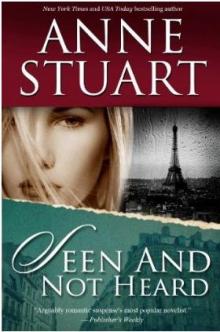 Seen and Not Heard
Seen and Not Heard Never Marry a Viscount
Never Marry a Viscount Heartless
Heartless The Devil's Waltz
The Devil's Waltz Hidden Honor
Hidden Honor Silver Falls
Silver Falls Fire and Ice
Fire and Ice Nightfall
Nightfall Never Trust a Pirate
Never Trust a Pirate The Soldier and the Baby
The Soldier and the Baby Still Lake
Still Lake Reckless
Reckless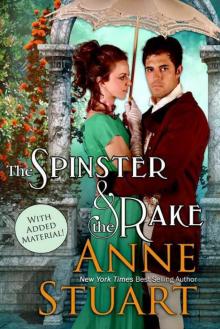 The Spinster and the Rake
The Spinster and the Rake Winter's Edge
Winter's Edge At the Edge of the Sun
At the Edge of the Sun Into the Fire
Into the Fire Night of the Phantom
Night of the Phantom Ritual Sins
Ritual Sins Darkness Before the Dawn
Darkness Before the Dawn Against the Wind
Against the Wind Ruthless
Ruthless The Catspaw Collection
The Catspaw Collection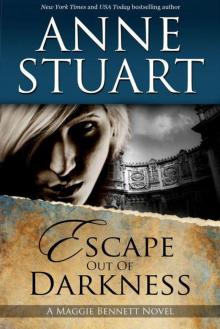 Escape Out of Darkness
Escape Out of Darkness The Widow
The Widow Shameless
Shameless Black Ice
Black Ice Breathless
Breathless Shadows at Sunset
Shadows at Sunset Falling Angel
Falling Angel Housebound
Housebound Cold as Ice
Cold as Ice The Wicked House of Rohan
The Wicked House of Rohan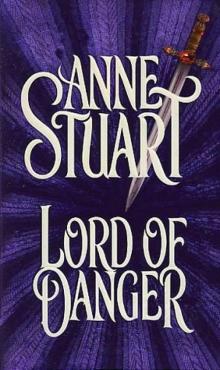 Lord of Danger
Lord of Danger The High Sheriff of Huntingdon
The High Sheriff of Huntingdon Wildfire
Wildfire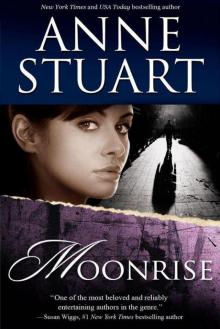 Moonrise
Moonrise The Demon Count's Daughter
The Demon Count's Daughter Date With a Devil
Date With a Devil To Love a Dark Lord
To Love a Dark Lord Driven by Fire
Driven by Fire Special Gifts
Special Gifts Ice Storm
Ice Storm Shadow Lover
Shadow Lover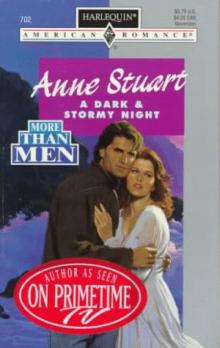 A Dark & Stormy Night
A Dark & Stormy Night Now You See Him...
Now You See Him... Lady Fortune
Lady Fortune Glass Houses
Glass Houses A Rose at Midnight
A Rose at Midnight Prince of Swords
Prince of Swords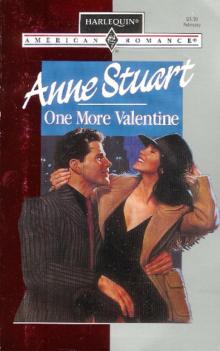 One More Valentine
One More Valentine Return to Christmas
Return to Christmas Tangled Lies
Tangled Lies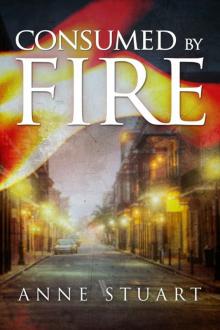 Consumed by Fire
Consumed by Fire The Fall of Maggie Brown
The Fall of Maggie Brown Wild Thing
Wild Thing Crazy Like a Fox
Crazy Like a Fox The Demon Count
The Demon Count Prince of Magic
Prince of Magic Wildfire (The Fire Series Book 3)
Wildfire (The Fire Series Book 3)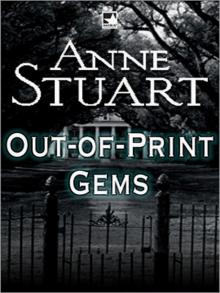 Anne Stuart's Out-of-Print Gems
Anne Stuart's Out-of-Print Gems Shadow Dance
Shadow Dance Under an Enchantment: A Novella
Under an Enchantment: A Novella Demonwood
Demonwood Blue Sage (Anne Stuart's Greatest Hits Book 3)
Blue Sage (Anne Stuart's Greatest Hits Book 3) Barrett's Hill
Barrett's Hill Angel's Wings (Anne Stuart's Bad Boys Book 5)
Angel's Wings (Anne Stuart's Bad Boys Book 5) Darkness Before Dawn
Darkness Before Dawn The Right Man
The Right Man The Houseparty
The Houseparty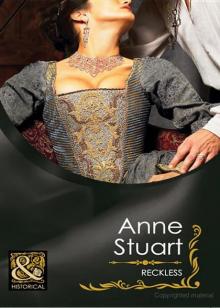 Reckless_Mills & Boon Historical
Reckless_Mills & Boon Historical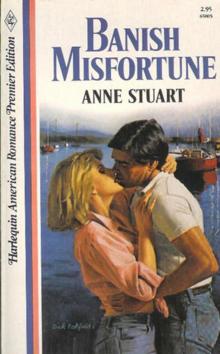 Banish Misfortune
Banish Misfortune Angel's Wings
Angel's Wings Chain of Love
Chain of Love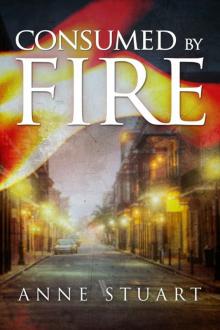 Consumed by Fire (The Fire Series)
Consumed by Fire (The Fire Series) Partners in Crime (Anne Stuart's Bad Boys Book 4)
Partners in Crime (Anne Stuart's Bad Boys Book 4) The Soldier, The Nun and The Baby (Anne Stuart's Greatest Hits Book 2)
The Soldier, The Nun and The Baby (Anne Stuart's Greatest Hits Book 2)